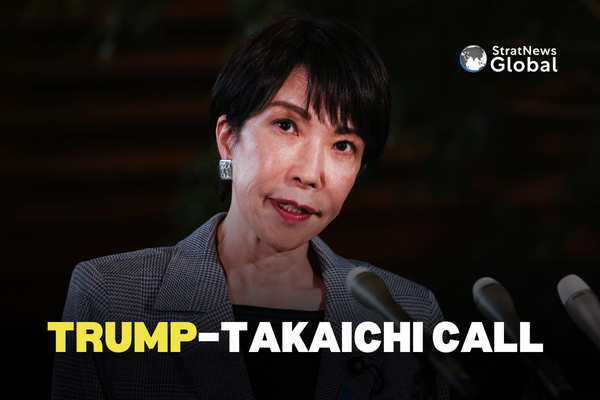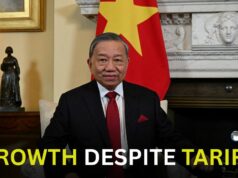President Donald Trump told Japanese Prime Minister Sanae Takaichi to “call me anytime” during their first phone conversation on Tuesday, following a major diplomatic clash between Tokyo and Beijing.
Takaichi’s earlier offhand remark in parliament that a potential Chinese attack on Taiwan could trigger Japanese military action provoked a furious response from China, including a suspension of travel to Japan.
China claims Taiwan, which lies just over 100 kilometres from Japanese territory, as its own and has not ruled out using force to seize control. The island’s government rejects Beijing’s claim, insisting that only Taiwan’s people can determine their future.
Trump has yet to comment publicly on the dispute between Japan, a key US security ally, and rival superpower China a silence that some Tokyo officials reportedly view with concern.
Speaking after her call with Trump, Takaichi sought to assure the public that the US president stood firmly by Japan. “President Trump mentioned that he and I are extremely good friends, and that I should call him anytime,” she told reporters, adding that Trump had taken the initiative to reach out.
She said Trump briefed her on the current state of US-China relations, including his recent conversation with Chinese President Xi Jinping.
Xi Reiterates Taiwan’s “Return to China”
During that earlier call, Xi told Trump that Taiwan’s “return to China” forms a crucial part of Beijing’s vision for the global order, according to China’s official Xinhua news agency.
Trump, in a Truth Social post, touted progress in trade talks and said relations with China were “extremely strong,” though he made no mention of Taiwan.
A Japanese government official familiar with the talks said Tokyo was relieved that Trump called Takaichi so soon after speaking with Xi, viewing it as a sign of reassurance. The White House did not immediately comment on Trump’s conversation with the Japanese leader.
Japan, Taiwan and Regional Security Concerns
On Tuesday, Taiwan Premier Cho Jung-tai said that for the island’s 23 million citizens, a “return” to China is not an option.
Japan’s Chief Cabinet Secretary Minoru Kihara told reporters that stable US-China ties were “extremely important for the international community, including Japan.” He declined to address Xi’s comments to Trump about Taiwan, noting the strategic importance of the surrounding sea routes for Japan’s trade and energy supply.
Backed by the US, Japan has been expanding its military capabilities to counter China’s growing regional influence. Earlier this week, Beijing condemned Tokyo’s plan to deploy a medium-range surface-to-air missile unit on Yonaguni Japan’s island closest to Taiwan accusing Tokyo of trying to “create regional tension and provoke confrontation.”
Japan also scrambled a fighter jet after detecting a Chinese drone flying between Yonaguni and Taiwan on Monday.
While Takaichi has resisted Chinese demands to retract her comments on Taiwan, Tokyo has signalled its willingness to engage in talks with Beijing at all levels. Japan’s vice foreign minister met with China’s ambassador in Tokyo on Tuesday to discuss pending issues and potential responses, local media reported.
However, Beijing ruled out a meeting between Takaichi and Chinese Premier Li Qiang on the sidelines of last weekend’s G20 summit in South Africa. Analysts say the decision signals a prolonged chill in Japan-China relations under Takaichi, a nationalist leader who has maintained high public approval since taking office last month.
Questions Over Trump’s Taiwan Policy
Although Trump has avoided direct involvement in the Japan-China dispute, his ambassador to Japan, George Glass, reaffirmed Washington’s support for Tokyo against what he described as Chinese “coercion.”
Still, some in Tokyo fear that Trump might soften his stance on Taiwan to secure a trade deal with China, a move that could embolden Beijing and destabilise East Asia.
“The Trump administration cannot be ruled out as one that might sacrifice the Taiwan issue for trade ‘deals’ with China,” wrote Seiko Mimaki, a professor of US politics and diplomacy at Doshisha University, in an editorial for the Asahi newspaper.
She added that understanding “the tendencies and risks inherent in the Trump administration” is vital when shaping policy toward China.
When asked by Reuters whether Tokyo was concerned about Trump’s silence on the issue, Japan’s Foreign Minister Toshimitsu Motegi said, “It is not the case, and has never been the case, that the White House or the State Department comments on every single issue, expressing support or non-support on each matter.”
(with inputs from Reuters)





